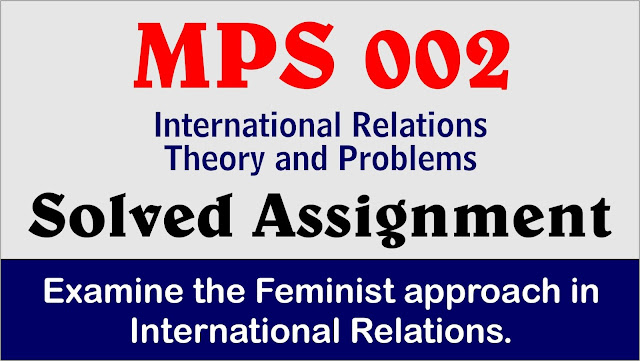2. Examine the Feminist
approach in International Relations.
Introduction
The discipline of diplomacy (IR) is integrally linked to the
rhythms of the worldwide political landscape. Emerging as a tutorial discipline
in 1919 after the horrors of the Second war , IR’s theorizing, methodological
approaches and political attention have since been focussed on producing
effective knowledge about the international realm (Brecher&Harvey 2005).
Traditionally this has involved attention to the more obvious
political sites of states, government, politicians and globally significant
wars, with conceptual and empirical attention consistently revolving around
security, anarchy and violence. Theoretically, the discipline has been
dominated for several decades by the triad realism, pluralism and
structuralism, though it's realism – a sort of ‘realpolitik’ – which remained
the overwhelmingly dominant theoretical approach (Smith 1994).
It had been not until the 1980s that other theoretical
approaches began to garner some traction. Indeed, following the autumn of the
Berlin Wall and therefore the emergence of the post-cold war period, there was
something of an explosion of theoretical approaches in IR, an inventory of
those would come with critical theory, postmodernism, poststructuralism,
feminism, and constructivism (Brecher&Harvey 2005). This plethora of
theories (especially compared to the previous six decades) spawned an abundance
of articles, books, workshops, conferences and new teaching programmes notably
within the US, Canada, the united kingdom and Australia. In tandem with these
theoretical inroads, critiques of the philosophical and epistemological
underpinnings of most, if not all, conventional theories and methodological
approaches was underway, typically framed because the ’post-positivist’ debate
(Smith, Booth&Zalewski 1996). As such, the post-Cold War period appears as
a distinctly apposite political and intellectual moment from which to offer an
account of 1 of those new approaches, namely feminism.
Feminism
may be a broad term given to works of these scholars who have sought to bring
gender concerns into the tutorial study of international politics and who have
used feminist theory and sometimes queer theory to raised understand global
politics and diplomacy .
Feminist Approach in International Relations In terms of
diplomacy (IR) theory, a feminist approach is grouped within the broad category
of theoretical approaches referred to as reflectivism, representing a
divergence from approaches adhering to a rationalist outlook supported the
premises of rational choice theory; reflectivist approaches, which also include
constructivism, post-structuralism, and postcolonialism, regard state
identities and interests as continuously in flux, in order that norms and
identity play the maximum amount a task in shaping policy as material
interests.
One of the
foremost influential works in feminist IR is Cynthia Enloe's Bananas, Beaches
and Bases (Pandora Press 1990). This text sought to chart the various different
roles that ladies play in international politics – as plantation sector
workers, diplomatic wives, sex workers on military bases etc. The important
point of this work was to stress how, when watching international politics from
the attitude of girls , one is forced to reconsider his or her personal assumptions
regarding what international politics is 'all about'.
However, it might be an error to think that feminist IR was
solely a matter of identifying what percentage groups of girls are positioned
within the international form of government . From its inception, feminist IR
has always shown a robust concern with brooding about men and, especially ,
masculinities. Indeed, many IR feminists argue that the discipline is
inherently masculine in nature. for instance , in her article "Sex and
Death within the Rational World of Defense Intellectuals" Signs (1988),
Carol Cohn claimed that a highly masculinised culture within the defense
establishment contributed to the divorcing of war from human emotion.
Feminist Anti-Militarism
Feminists within IR often look to how conceptions of
masculinity have shaped policy , state identity, and security and armament
during and out of doors of warfare. One tradition that exists within the sector
for this purpose is that of feminist anti-militarism. this is often a stance
within Feminist diplomacy that opposes weapons of mass destruction, like
nuclear weaponry, and holds gender accountable partially for the propagation of
militarism. Gender becomes embedded in relations of power as that which is seen
to be stronger is assigned a masculinized identity, while concepts like emotion
are seen as indicators of weakness and become related to femininity. during
this way, the military capability and capability of a state becomes related to
its degree of masculinity, which feminist anti-militarists see as problematic.
As disarmament might be perceived as emasculatory, states are
less likely to disarm; consequently, militarism becomes normalized, downplayed,
and more likely to incite warfare. These are a number of the concepts that Carol
Cohn and Sara Ruddick explored in their article “Feminist Ethical Perspective
on Weapons of Mass Destruction,” (2003) which laid out the meaning behind what
they mentioned as “anti-war feminism”.They explain that it opposes the
utilization of weapons of mass destruction whether for military, political, or
deterring purposes, yet that it differs from pacifism therein it doesn't
outright reject all sorts of warfare. Such opposition stems partly from the
questionability of how effective warfare/militarism is, and whether the prices
, (albeit monetary, environmental, and particularly human) that are inevitably
incurred yet not always accounted, for are worthwhile .
Previous Question
Next Question
For Assignment PDF
Subcribe YouTube : My IGNOU Solutions
Subcribe YouTube : My IGNOU Solutions
WhatsApp Contact : 8130208920









